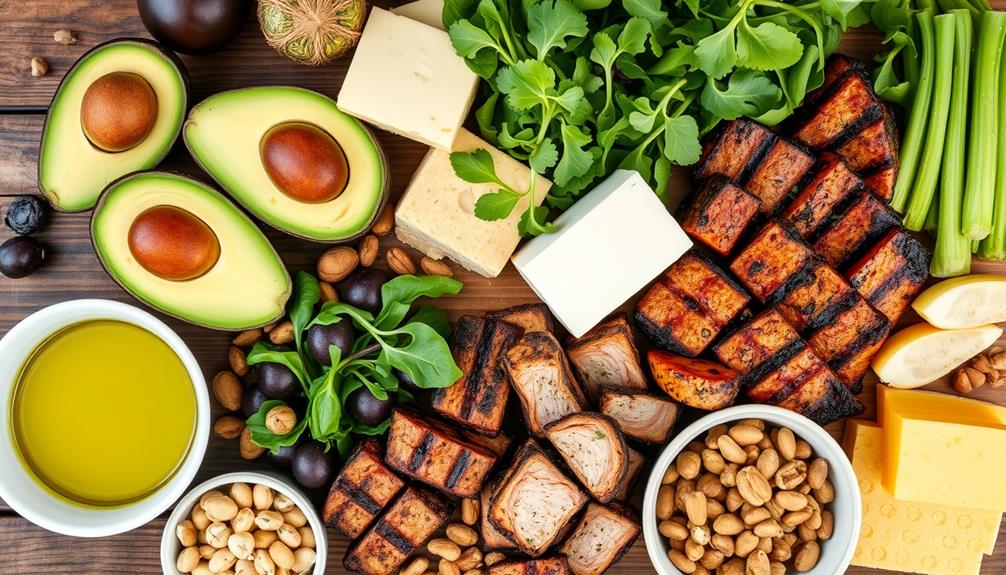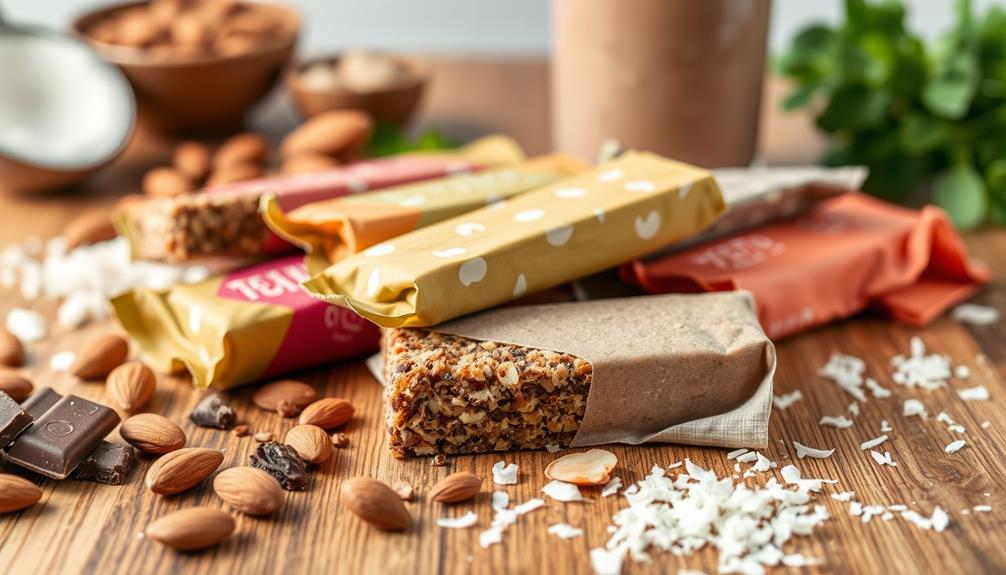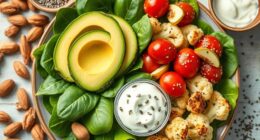Yes, you can definitely eat cheese on the keto diet! Many cheeses are high in fat and low in carbs, making them perfect for maintaining ketosis. Varieties like goat cheese, blue cheese, and Parmesan have minimal carbs, often less than 1g per serving. Full-fat, minimally processed cheeses not only align well with keto goals but also provide essential nutrients such as calcium and protein. Just steer clear of processed cheeses and low-fat options, as they can contain hidden sugars. Want to know which cheeses are best for your meals? There's more to explore!
Key Takeaways
- Cheese is high in fat (70-80%) and low in carbs, making it suitable for the keto diet.
- Many cheese varieties, like goat cheese and Parmesan, contain minimal carbohydrates, aiding in maintaining ketosis.
- Full-fat, minimally processed cheeses provide essential nutrients like calcium and vitamin B12 beneficial for overall health.
- Moderation is key; while cheese can promote satiety, excessive intake may disrupt ketosis.
- Avoid processed and low-fat cheeses as they often contain unhealthy additives and higher carb content.
Importance of Cheese on Keto

Cheese plays an essential role in the keto diet, not just for its high fat content but also for its ability to keep your meals flavorful and satisfying. With a caloric value made up of 70-80% fat, cheese perfectly aligns with the macronutrient ratios required for keto. You'll find that many cheese varieties, like goat cheese and Parmesan, have minimal carb content, helping you maintain ketosis without sacrificing taste.
Additionally, incorporating cheese into your meals can support effective strategies for weight loss by enhancing satiety and making low-carb meals more enjoyable.
In addition to being low in carbs, cheese is a great source of protein and essential nutrients, including calcium and vitamins, which can enhance your overall health while following a low-carb lifestyle. The creamy texture and rich flavors of cheese contribute to your meals, making it easier to stick to the keto diet.
Furthermore, consuming cheese can increase satiety, keeping you full longer and potentially aiding in weight loss.
Choosing full-fat and minimally processed cheese options allows you to enjoy healthy fats that support your keto goals. Whether you're grating Parmesan over a salad or indulging in a slice of cheddar, incorporating cheese into your meals is a delicious way to stay on track with your keto journey.
Best Cheeses for Keto

When picking the best cheeses for your keto diet, you've got some delicious options.
Cheeses like goat, blue, and cheddar not only keep carbs low but also pack in healthy fats and protein.
Incorporating these cheeses can help maintain your budget while enjoying flavorful meals.
Let's explore how these choices can benefit your meals and how to get creative with them!
Top Cheese Choices
For those on the keto diet, selecting the right cheeses can make a significant difference in achieving your nutritional goals. Here are some of the best cheeses to eat that align perfectly with your low-carb diet:
| Cheese | Carbs (g) | Fat (g) | Protein (g) |
|---|---|---|---|
| Goat Cheese | 0 | 8.45 | 6.12 |
| Blue Cheese | <0.5 | 6.04 | 4.49 |
| Parmesan Cheese | 0.695 | 1.39 | 1.42 |
| Cream Cheese | 0.992 | 8.11 | 2.01 |
| Cheddar Cheese | <1 | 9 | 7 |
These options provide a great balance of fat and protein while keeping carbs low. Goat cheese is particularly digestible, making it a favorite among keto enthusiasts. Blue cheese offers a bold flavor with minimal carb impact. Parmesan adds a savory touch, while cream cheese is versatile for various recipes. Cheddar cheese rounds out your choices with its satisfying richness. Incorporating these cheeses into your meals can enhance your keto experience!
Nutritional Benefits of Cheese
Incorporating high-quality cheeses into your keto diet not only enhances flavor but also offers considerable nutritional benefits. Cheese contains essential vitamins and minerals, such as calcium, vitamin A, and B12, which are crucial for bone health and energy metabolism. Additionally, cheese is rich in antioxidants, providing health benefits that can support overall wellness.
High-fat cheeses like goat cheese and blue cheese are perfect keto foods, typically containing minimal carbohydrates, often between 0-0.5g per serving. This low carb content helps maintain your carbohydrate intake in check, keeping you in ketosis.
Parmesan cheese is particularly beneficial, providing around 0.7g of carbs and approximately 1.42g of protein per tablespoon, which supports muscle maintenance and promotes satiety. Cream cheese, with about 1g of carbs and 8g of fat per ounce, adds a creamy texture to your meals without greatly impacting your carb count.
Hard cheeses, such as cheddar and Gruyère, also make excellent choices, offering less than 1g of carbs per ounce while delivering rich flavors. By including these high-fat cheeses in your diet, you not only enjoy delicious meals but also reap the nutritional benefits that support your overall health while following a keto lifestyle.
Incorporating Cheese Creatively
How can you elevate your keto meals with cheese? By incorporating a variety of delicious cheeses, you can enhance flavors while keeping your carb intake low.
Additionally, it's important to reflect on the nutritional benefits of each cheese, as they can contribute to a balanced keto diet. Here are some of the best types of cheese that keto dieters eat:
- Goat cheese: Zero carbs, 8.45g fat, and 6.12g protein per 1 oz. Easy to digest, great for salads or spreads.
- Blue cheese: Less than 0.5g carbs, 6.04g fat, and 4.49g protein per 21g slice. Perfect for bold dressings or dips.
- Parmesan cheese: Only 0.695g carbs, 1.42g protein, and 1.39g fat per 5g tablespoon. Sprinkle on veggies or use in sauces.
- Cream cheese: Contains 0.992g carbs, 8.11g fat, and 2.01g protein per 1 oz. Ideal for rich sauces or creamy soups.
- Hard cheeses (like cheddar): Less than 1g carbs, 9g fat, and 7g protein per 1 oz. Versatile for snacking or cooking.
Incorporating these cheeses can't only keep your meals exciting but also align with your dietary goals, as seen in cold medications impact.
Worst Cheeses for Keto
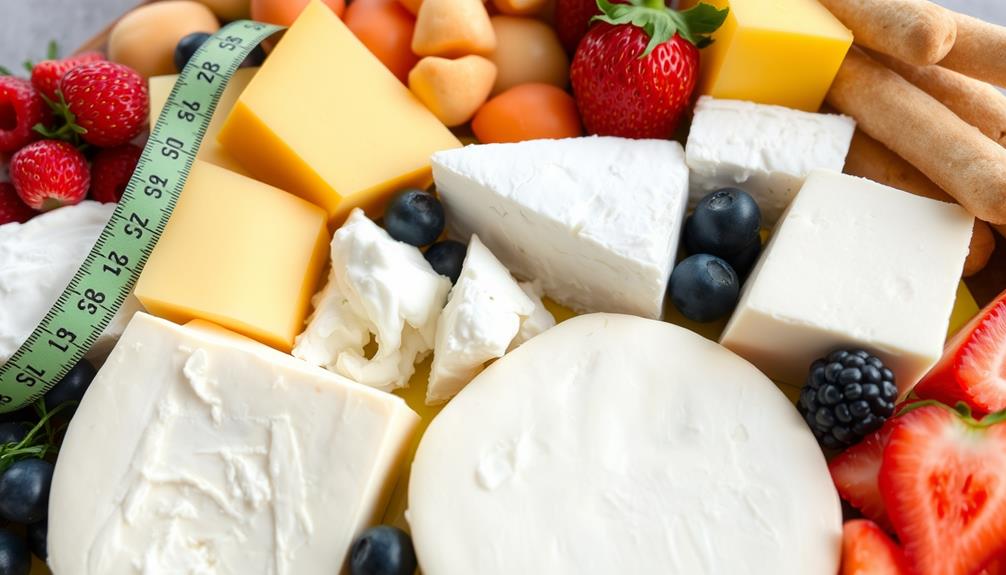
When you're following a keto diet, some cheeses can really throw you off track.
Processed cheeses and low-fat varieties often pack in additives and carbs that just don't fit with your low-carb goals.
It's crucial to be aware of mammography guidelines when considering your overall health, as even seemingly innocent options like cottage cheese can add up quickly in carbs and disrupt your ketosis.
Be cautious, as these choices can hinder your progress.
Processed Cheese Risks
Processed cheese might seem like a convenient option for your keto diet, but it often comes with hidden risks that can derail your progress. Many varieties of processed cheese are highly processed and can contain unhealthy fats, additives, and preservatives, making them less than ideal for your keto goals.
Additionally, poor dietary choices can lead to increased cravings and difficulty in maintaining the desired ketosis state, similar to how inadequate maintenance can lead to decreased efficiency in heat pump systems optimal comfort in varying weather conditions.
Here are some of the worst offenders to keep in mind:
- American cheese: Contains about 2g of carbs per slice, hindering your ketosis efforts.
- Canned or spray cheese: Heavily processed and provides minimal nutritional benefits, often packed with extra sugars.
- Low-fat cheese: Lacks sufficient fat content (like low-fat cheddar with only 2g of fat) to meet your macronutrient requirements.
- Cottage cheese: While it's high in protein (11.6g per ½ cup), it has around 4.53g of carbs, which complicates strict keto adherence.
- Cheese spreads: Usually loaded with unhealthy fats and additives, they do little for your health.
High Carb Options
Choosing the right types of cheese is essential for your success on the keto diet, especially if you want to avoid high carb options that can hinder your progress.
Individuals with certain mental health conditions, such as Borderline Personality Disorder (BPD), may also face challenges in maintaining a diet due to emotional eating triggered by instability in mood and functioning.
Some cheeses may seem harmless but are actually detrimental to your keto journey. For example, cottage cheese contains approximately 5g of carbs per half-cup serving, making it less favorable for strict keto dieters.
Processed cheese products, like American cheese, typically have about 2g of carbs per slice and are heavily processed, filled with additives that don't align with your keto goals.
Low-fat cheese is another risky choice; it often lacks sufficient fat, vital for maintaining the ketogenic macronutrient ratio. Instead of supporting your diet, low-fat varieties can throw off your progress.
Canned or spray cheese is particularly concerning; these heavily processed options offer minimal nutritional benefits and often contain hidden sugars that can disrupt ketosis.
Health Benefits of Cheese
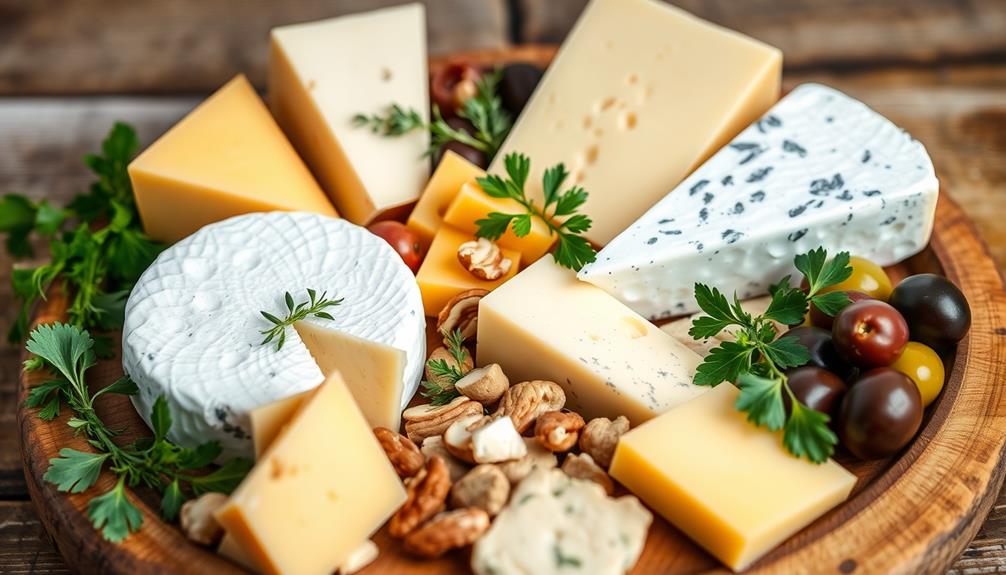
The health benefits of cheese go beyond its delightful flavor, making it a valuable addition to the keto diet. Cheese is a powerhouse of nutrients that can support your overall health while keeping you satisfied on low-carb meals. Here are some key advantages you can enjoy:
- Rich in Calcium: Essential for strong bones and muscle function, cheese helps maintain your body's structure. Additionally, certain cheeses like Gouda and Blue Cheese can contribute to overall wellness with their beneficial probiotics.
- High in Protein: With options like Parmesan offering up to 10 grams of protein per ounce, cheese aids in muscle repair and growth.
- Supports Weight Management: Cheeses like Gouda and cheddar contain beneficial fats that promote satiety, helping you avoid overeating.
- Enhances Gut Health: Varieties such as Gouda and Blue Cheese are packed with probiotics, which can improve digestion.
- Promotes Fullness: The healthy fats in cheese can keep you feeling full, potentially assisting in weight loss by reducing overall calorie intake.
Incorporating cheese into your keto diet not only satisfies your taste buds but also delivers numerous health benefits that support your dietary goals. Enjoy the creamy, rich flavors while reaping the advantages!
Cheese and Cholesterol Concerns

When incorporating cheese into your keto diet, you might've some concerns about its impact on cholesterol levels. The saturated fat content in cheese can influence cholesterol, but individual responses vary considerably.
Whole cheeses often pack more nutrients than their low-fat counterparts, providing essential fats that are critical for a successful keto diet. Additionally, understanding the risks and rewards of Bitcoin IRAs can offer insights into managing dietary risks effectively.
Research on cheese consumption and heart health is still ongoing. Some studies suggest that moderate cheese intake may not negatively impact cholesterol levels for many individuals. However, it's important to monitor your overall saturated fat intake from cheese and other sources to maintain heart health while enjoying your favorite dairy products.
If you have pre-existing cholesterol concerns, it's wise to consult a healthcare provider for personalized dietary guidance regarding cheese consumption. They can help you navigate your cheese choices and guarantee they align with your health goals.
Incorporating Cheese Into Keto Meals
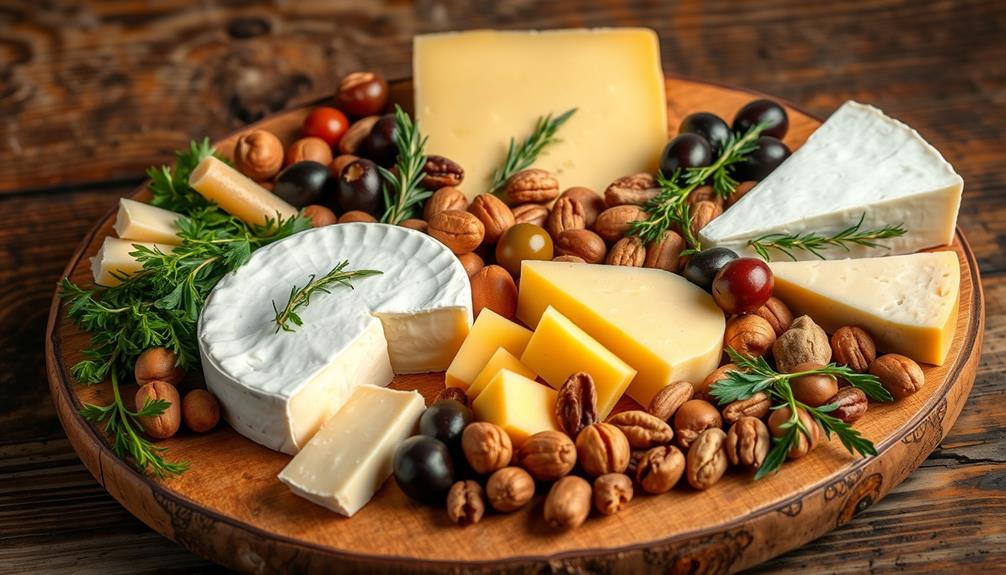
Incorporating cheese into your keto meals can elevate flavors while keeping your carb intake low. When you're following the keto diet, choosing the right types of cheese can make a significant difference in your meals. Many cheese varieties not only fit the low-carb requirement but also enhance the overall taste and texture of your dishes, making them more enjoyable.
Here are some of the best options for low carbs and high fat content:
- Parmesan and Blue Cheese: Both have around 0.5g of carbs per serving, providing rich flavors.
- Feta: With only 0.4g of carbs per serving, it boosts protein per serving while remaining keto-friendly.
- Cheese Crisps: Made from shredded cheese baked until crispy, these snacks contain about 1g of carbs per ounce.
- Cream Cheese: Perfect for dips or sauces, it offers versatility with approximately 1g of carbs per ounce.
- Cheddar: This classic cheese contains less than 1g of carbs per ounce, making it ideal for casseroles and omelets.
Additionally, exploring various cheese types can lead to delightful discoveries, much like the numerous varieties available in coffee that excite taste buds.
Cheese and Weight Loss

While some might think that cheese is off-limits in a weight loss journey, it can actually play a beneficial role in your keto diet. Research shows that higher cheese intake is linked to a lower BMI over time, suggesting it can support your weight loss efforts. Cheese is rich in grams of fat and high protein, which enhances satiety and helps curb hunger. This makes it easier to stick to your ketogenic diet without feeling deprived.
However, moderation is key. While cheese can help you create a calorie deficit, overindulging may lead to a weight loss plateau. Plus, its high calcium content supports muscle function and bone health, essential during your weight loss journey.
Here's a quick breakdown of cheese's benefits for weight loss:
| Nutrient | Benefit | Example Cheese |
|---|---|---|
| Grams of Fat | Enhances satiety | Cheddar |
| Minimal Carbs | Keeps you in ketosis | Mozzarella |
| High Protein | Supports muscle retention | Parmesan |
When incorporated wisely, cheese can add flavor and texture to your meals, making your keto journey enjoyable.
Selecting Quality Cheese for Keto
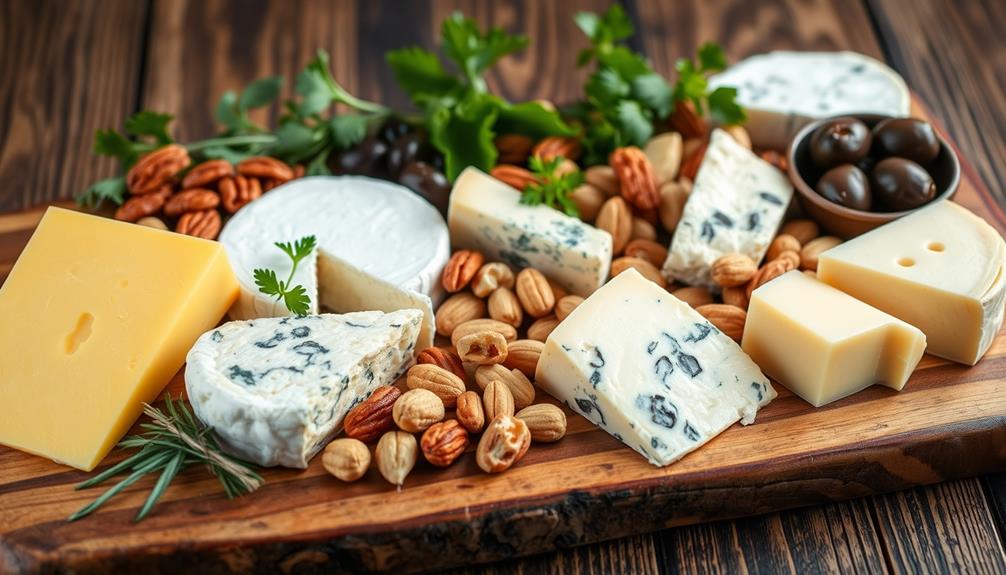
Choosing the right cheese is essential for your keto diet success. When you're selecting quality cheese, focus on high-fat options that will help you stay in ketosis while enjoying your meals. Aim for cheeses with low carbohydrates and a fat content that exceeds protein.
Here are some tips to guide you:
- Pick hard cheeses like Parmesan and aged Gouda, which are lower in carbs.
- Opt for full-fat versions of cheddar, blue cheese, and goat cheese to maximize fat intake.
- Avoid processed cheeses that contain additives, preservatives, and hidden sugars.
- Check nutrition labels meticulously to guarantee the cheese aligns with your keto goals.
- Look for cheeses with less than 10% of calories from carbohydrates to maintain ketosis effectively.
Expert Insights on Cheese and Keto

Experts agree that cheese can be a game-changer for your keto diet, thanks to its rich fat content and low carbohydrates. When you're aiming for nutritional ketosis, high-fat cheese options like Parmesan, blue cheese, and goat cheese are your best friends. These cheeses typically have minimal to zero grams of carbs, making them ideal for maintaining those essential keto macronutrient ratios.
Functional dietitians highlight the importance of knowing the carbohydrate content in different cheese varieties. For instance, cottage cheese packs in considerably more carbs compared to cheddar or cream cheese. This knowledge helps you make informed choices that support your weight management goals.
However, moderation is key. While cheese is keto-friendly, overconsumption can lead to excess calorie intake, which might disrupt your ketosis and hinder weight loss efforts.
Research shows that higher cheese consumption correlates with a lower body mass index (BMI), suggesting that when enjoyed in moderation, cheese can indeed support your keto journey.
Frequently Asked Questions
What Kind of Cheese Can I Eat on Keto?
You can enjoy several cheeses on keto! Options like goat cheese, blue cheese, Parmesan, cheddar, and Gruyère fit perfectly. Just steer clear of processed cheeses and low-fat varieties to maintain your diet's effectiveness.
What Are the Top 10 Keto Foods?
You'll feel like a culinary superhero with top keto foods! Picture avocados, eggs, leafy greens, fatty fish, nuts, seeds, and more. These delicious, low-carb powerhouses fuel your journey to ketosis while satisfying your taste buds!
Can I Eat Unlimited Cheese on Keto?
You can't eat unlimited cheese on keto. It's calorie-dense and might disrupt your progress. Moderation's key, so enjoy cheese in controlled portions while balancing it with other nutrient-dense, low-carb foods for best results.
Which Cheese Has No Carbs?
If you're dreaming of cheese with zero carbs, goat cheese is your golden ticket! Immerse yourself in blue cheese too, and savor its low-carb delight. Parmesan and cream cheese also keep your carb count blissfully low. Enjoy!
Conclusion
Incorporating cheese into your keto diet can be both delicious and beneficial. Did you know that cheese can have as little as 1 gram of carbs per ounce? This makes it an excellent choice for keeping your carb intake low while enjoying a variety of flavors. Remember to choose quality cheeses and balance your portions. With the right selections, cheese can enhance your meals, support your weight loss goals, and add to the enjoyment of your keto journey.

